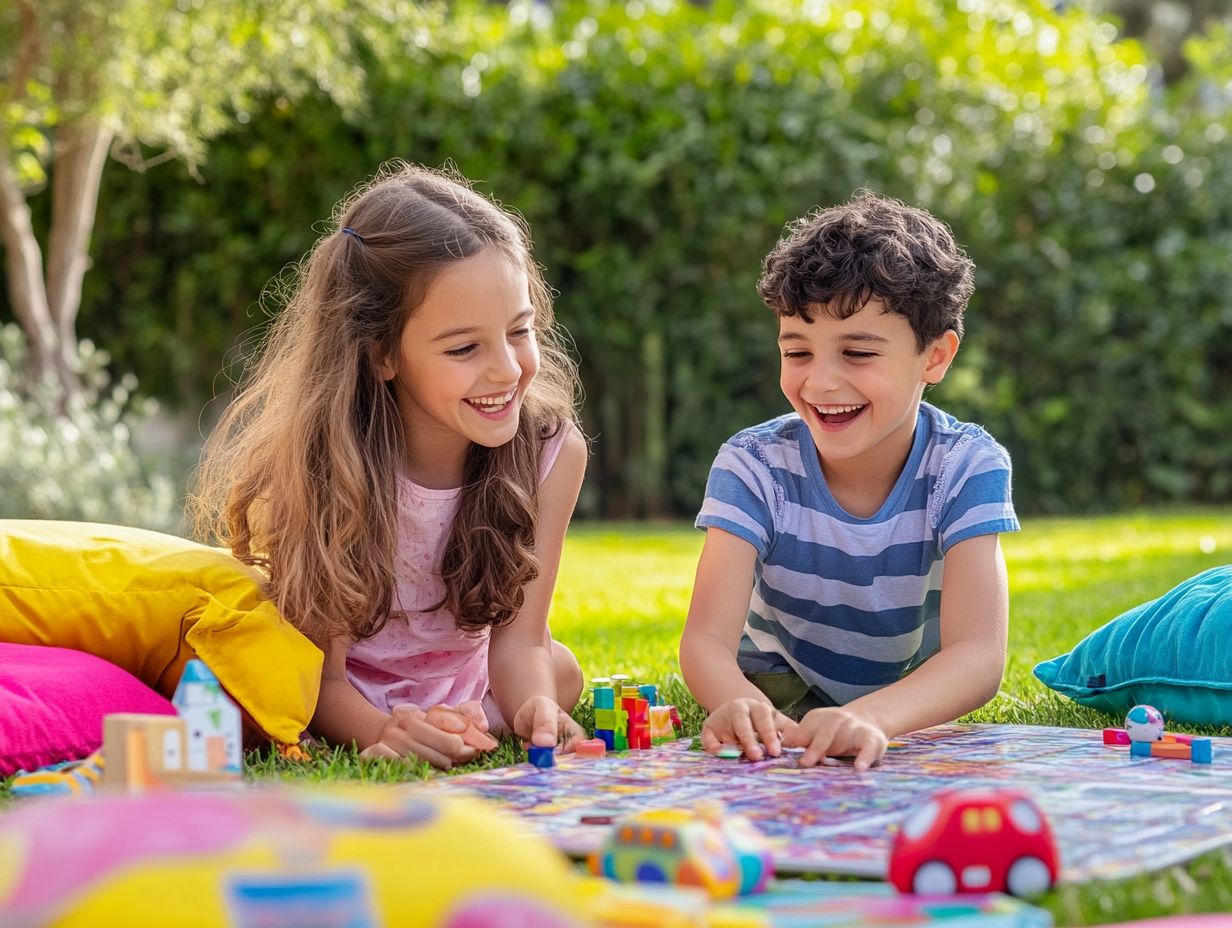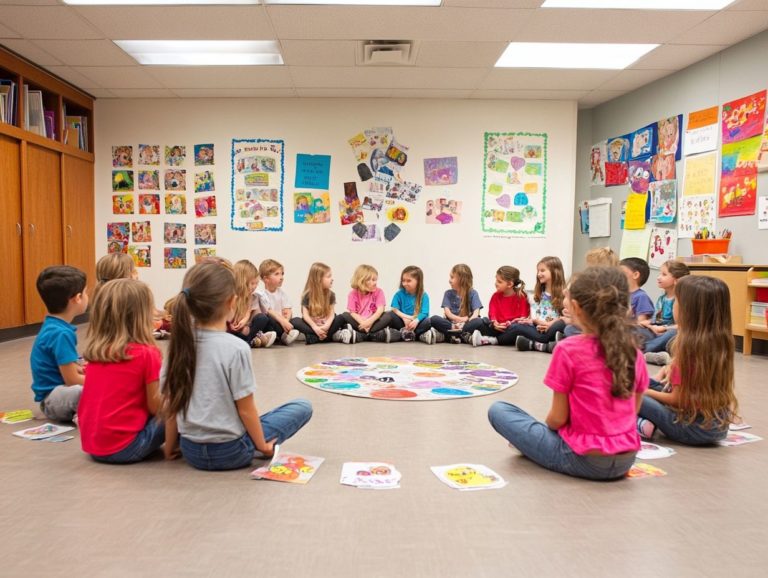How to Promote Healthy Relationships Among Siblings?
Sibling relationships can be among the most significant and lasting connections in your life. However, nurturing a healthy bond between brothers and sisters often demands intentional effort on your part as a parent. Promoting sibling warmth and understanding can help mitigate conflicts between siblings and foster positive family dynamics.
This article delves into practical strategies that encourage open communication, teach conflict resolution, and foster mutual respect among siblings. You will also find engaging activities designed to strengthen their bond, along with valuable tips on how you can support these dynamics effectively. By understanding the behavioral influence siblings have on each other, you can navigate relationships more effectively. Let’s dive into these practical strategies together!
Uncover the secrets to cultivating a harmonious sibling relationship that endures through the years, leading to lifelong friendships and emotional support!
Contents
- Key Takeaways:
- How to Promote Healthy Sibling Relationships?
- Activities to Strengthen Sibling Relationships
- 2. Sibling Bonding Trips
- 3. Collaborative Projects
- How Parents Can Support Healthy Sibling Relationships?
- 2. Avoid Comparisons
- 3. Encourage Positive Interactions
- 4. Address Conflicts Appropriately
- Frequently Asked Questions
- How Parents Can Promote Healthy Sibling Relationships
- Why Is It Important to Promote Healthy Relationships Among Siblings?
- What Can Parents Do If Their Children Have a Difficult Relationship?
- How can parents prevent rivalry and competition among siblings?
Key Takeaways:

- Encourage open and effective communication between siblings to build trust and understanding, which can mitigate the negative effects of conflicts between siblings.
- Teach conflict resolution skills to promote healthy ways of resolving disagreements.
- Support individuality and respect among siblings to avoid comparison and foster positive relationships, thereby enhancing their self-worth and emotional well-being.
How to Promote Healthy Sibling Relationships?
Promoting healthy sibling relationships is essential for your children’s emotional well-being and overall development during childhood. Siblings have a profound influence on one another through their interactions. Cultivating positive relationships among them establishes a foundation for strong bonds that can endure a lifetime.
According to studies like those from the Harvard Study of Adult Development, healthy sibling bonds can also positively impact mental health and academic engagement.
By fostering an environment that emphasizes cooperation and understanding, you can guide your children in navigating conflicts, sharing cherished memories, and appreciating their unique connections within the family. These nurturing sibling dynamics not only enhance social skills but also reinforce family traditions, creating a shared history that enriches emotional support in their adult relationships.
Parental involvement is key in achieving this, as it helps children understand each other’s perspectives and build rituals that strengthen sibling bonds.
1. Encourage Communication
Encouraging open communication among siblings can truly nurture emotional intimacy and deepen their understanding of each other s perspectives. By employing effective communication strategies like active listening and openly expressing feelings, siblings can cultivate a more supportive environment.
According to experts like Linda Stade and Jeffrey Kluger, effective communication can also reduce sibling conflicts and foster a sense of emotional intimacy. For example, when one sibling shares a concern, the other should restate their thoughts to ensure clarity before responding.
This approach not only shows that they have been heard but also affirms the validity of their emotions. Setting aside regular time for honest conversations allows siblings to articulate their feelings and concerns more freely.
Practicing gratitude towards one another reinforces positive behavior and strengthens their bond, ultimately enriching their relationship.
2. Teach Conflict Resolution Skills
Teaching children effective conflict resolution skills is crucial for managing conflicts between siblings and nurturing harmonious relationships. Dr. Laurie Kramer from Northeastern University emphasizes the importance of teaching repair strategies in reducing the negative effects of sibling fights.
By implementing techniques like active listening and negotiation, your children can learn to express their feelings while also understanding each other’s perspectives. For example, when siblings find themselves in a tug-of-war over toys, you can facilitate a discussion where each child shares their viewpoint, allowing the other to listen attentively.
It’s equally important to demonstrate repair strategies after a conflict arises. If an argument breaks out, encourage your children to apologize, acknowledge their mistakes, and brainstorm ways to prevent similar issues in the future.
This approach not only addresses immediate concerns but also strengthens their bond, equipping them with valuable life skills along the way.
Start applying these strategies today to cultivate strong sibling bonds.
3. Foster Mutual Respect
Fostering mutual respect between siblings is essential for building close relationships that significantly enhance their emotional well-being. Engaging in family activities like family meals and family jokes can further strengthen their bond.
When children learn to appreciate each other’s unique qualities and perspectives, they not only strengthen their bond but also acquire invaluable life skills.
To cultivate this enriching environment, you can implement various strategies into your daily routines.
For instance, encouraging collaborative activities allows siblings to work towards common goals, fostering a sense of teamwork. Celebrating each child’s individual achievements whether grand or modest instills a profound sense of pride and respect for one another.
Engaging in regular family discussions about respecting differences in interests, skills, and personalities can further highlight the importance of valuing each sibling’s contributions. By taking these steps, you can create a supportive atmosphere where mutual respect thrives.
4. Promote Individuality

Promoting individuality among siblings is essential for helping them develop their unique identities while building close relationships. Celebrating family stories and individual achievements provides essential support and validation for each child’s journey.
By actively encouraging each child’s distinct interests and talents, parents can play a pivotal role in their growth. You can achieve this by providing opportunities for exploration consider enrolling your children in various extracurricular activities that align with their passions or offering resources tailored to their specific talents.
Engaging in open discussions about each sibling’s achievements fosters an environment of support and validation, ensuring they feel appreciated for their unique qualities. This kind of encouragement strengthens their self-esteem and cultivates a sense of closeness, allowing them to celebrate each other’s successes and build a strong, trusting bond.
Activities to Strengthen Sibling Relationships
Engaging in activities together can profoundly enhance sibling relationships, as it fosters shared experiences and memories that enrich their connection. Establishing unique ties through shared activities can also boost self-worth and emotional intimacy.
1. Family Game Night
Family game night is the perfect opportunity for family bonding, allowing siblings to compete, cultivate teamwork, and learn how to navigate the occasional sibling squabble. According to the American Psychological Association, such activities can significantly enhance family dynamics and childhood memories.
Beyond just strengthening relationships, these evenings are a fantastic chance for family members to hone their communication skills. Engaging in friendly competition encourages you to articulate your thoughts and strategies, paving the way for deeper discussions and greater understanding among everyone.
Whether you opt for a classic board game like Monopoly that imparts lessons in money management or choose cooperative games such as Pandemic that require teamwork, there s something for every age and interest.
For the younger ones, games like Candy Land or Uno help develop foundational skills like counting and color recognition. Meanwhile, older players may relish strategy games like Settlers of Catan or Ticket to Ride, ensuring that everyone s preferences are embraced during these cherished gatherings.
Start planning your family game night tonight to strengthen your siblings bond!
2. Sibling Bonding Trips
Taking sibling bonding trips can create lasting memories and shared experiences that enhance family dynamics and emotional intimacy. From hiking to visiting historical sites, these activities allow siblings to build unique ties and shared history.
Whether you embark on a quick weekend getaway to a nearby park or set off on a more adventurous trek across the country, exploring new places together can deepen your connection in remarkable ways! Activities like hiking, camping, or even enjoying a simple day at the beach allow siblings to work together and support one another, boosting trust and understanding.
These shared moments often lead to rich conversations and laughter, creating invaluable opportunities for growth. Thus, it is essential to prioritize these adventures amidst the hustle of everyday life. Ultimately, the joy found in exploring the world together will create cherished stories that you ll reminisce about for years to come!
3. Collaborative Projects
Engaging your siblings in collaborative projects can cultivate teamwork and forge a shared history that deepens emotional connections. Activities like community service or collaborative arts can promote family bonding and lasting connections.
Consider a range of activities, such as arts and crafts, where you can express your creativity together while honing communication and negotiation skills. Alternatively, explore community service opportunities by working side by side on meaningful tasks, like organizing a neighborhood clean-up or volunteering at a local shelter.
These experiences will challenge you to problem-solve together, fostering an environment where listening to each other s perspectives becomes essential. As you work toward shared goals, you’ll develop valuable skills and strengthen your bond, creating memories that you ll cherish and reflect upon fondly in the years to come.
How Parents Can Support Healthy Sibling Relationships?

Parents hold a crucial position in nurturing healthy sibling relationships. By actively engaging in their children’s lives and providing guidance during conflicts, they can foster a harmonious environment that encourages understanding and cooperation among siblings. According to experts like Jane Austen and CNN Health, parental involvement is key for teaching conflict management and building emotional support within the family.
1. Set a Good Example
Setting a good example is essential for parents in nurturing strong sibling relationships and cultivating positive family dynamics.
When children witness their parents engaging in healthy communication, they are more likely to mirror these behaviors in their own interactions. For example, by showing empathy and actively listening during discussions, parents teach the significance of understanding different perspectives. Similarly, demonstrating effective conflict resolution skills such as calmly addressing disagreements and seeking common ground equips children to navigate their own disputes with respect and understanding.
It is also important to emphasize mutual respect by valuing each family member’s opinions and feelings. This fosters an environment where everyone feels heard and appreciated. By consistently modeling these practices, parents lay the groundwork for children to develop strong, positive relationships with one another, understanding the importance of sibling warmth and emotional intimacy.
Start today to strengthen your family bonds!
2. Avoid Comparisons
Avoiding comparisons between siblings is crucial for preventing rivalry and nurturing individual emotional well-being and self-worth.
When parents inadvertently compare one child’s achievements with another’s, it can stir feelings of inadequacy and resentment. This strains their bond and makes it difficult for siblings to genuinely support one another.
Instead, by recognizing and celebrating each child s unique strengths, you can create a positive environment that embraces individuality. Encouraging personal accomplishments and providing opportunities for each sibling to shine in their own way fosters a deeper appreciation for one another.
This thoughtful approach nurtures healthy relationships and emotional resilience among siblings, ultimately paving the way for lifelong support and companionship.
3. Encourage Positive Interactions
Encouraging positive interactions among siblings can cultivate an atmosphere brimming with emotional support and warmth, while reinforcing cherished family traditions and shared experiences.
Facilitating shared activities like cooking meals or playing games creates a natural environment for teamwork and mutual respect. These fun, shared moments not only strengthen their bond but also teach essential life skills!
These collaborative tasks not only strengthen their bond but also impart valuable lessons about responsibility and cooperation. As siblings navigate challenges together, they enhance their communication skills and learn to support one another through life’s ups and downs, creating lasting connections and lifelong friendships.
This spirit of collaboration fosters a nurturing environment where family values can flourish, allowing siblings to develop emotional resilience and a sense of belonging. Such foundations pave the way for deeper connections as they journey through life together.
4. Address Conflicts Appropriately
Addressing conflicts appropriately is essential for teaching sibling conflict and conflict resolution skills, while maintaining emotional intimacy.
By fostering open dialogue between siblings, you play a critical role in enabling them to express their feelings and thoughts during disagreements. This approach creates a safe environment where children can share their perspectives without the fear of judgment.
Utilizing techniques such as active listening and validating each child’s emotions can significantly enhance understanding and empathy. You can also model positive conflict resolution strategies, demonstrating to your children how to negotiate and compromise effectively.
Ultimately, nurturing these vital skills not only resolves immediate issues but also equips siblings with the tools they need to sustain harmonious relationships throughout their lives, helping them in navigating relationships and maintaining a support system.
Frequently Asked Questions

What are some tips for promoting healthy relationships among siblings? (Inspired by Linda Stade and Laurie Kramer)
- Encourage open communication: Encourage siblings to speak openly and honestly with each other to foster a healthy and strong relationship. This helps in building lasting connections and mutual respect.
- Teach conflict resolution skills: Siblings should learn how to resolve conflicts in a calm and respectful manner to maintain a positive relationship. This includes teaching repair methods after arguments.
- Promote equality: Avoid favoritism and treat all siblings equally to prevent feelings of resentment and jealousy. This can prevent sibling rivalry and foster sibling closeness.
- Encourage bonding activities: Plan activities that siblings can do together, such as game nights or family outings, to strengthen their bond.
- Set a good example: As a parent, model positive and respectful behavior towards your children and your own siblings to show them how to have a healthy relationship.
- Acknowledge and address issues: If there are underlying issues between siblings, address them openly and help them find solutions to promote a healthier relationship. Seek inspiration from Jeffrey Kluger, who has written extensively on sibling dynamics.
How Parents Can Promote Healthy Sibling Relationships
Advice from Shawn Whiteman and Susan McHale
1. Encourage positive interactions. Praise siblings when they get along or resolve conflicts positively. This reinforces good behavior and highlights sibling influence.
2. Avoid comparisons. Focus on each child’s unique strengths to prevent rivalry and competition.
3. Mediate conflicts. Step in when conflicts arise to guide siblings towards peaceful resolutions. Help them understand each other’s perspectives.
4. Create a peaceful environment. Set clear rules for behavior and foster a loving home.
5. Support individual relationships. Encourage one-on-one time to strengthen their bond and emotional support for each other.
6. Seek outside help if needed. If conflicts persist, consider consulting a therapist for underlying issues.
Why Is It Important to Promote Healthy Relationships Among Siblings?
Insights from the Harvard Study of Adult Development
1. Stronger family bond. Healthy sibling relationships strengthen the overall bond within the family and enhance family dynamics.
2. Lifelong support system. Siblings are often the longest-lasting relationships in a person’s life, creating a strong support system for the future.
3. Positive influence. Healthy relationships can significantly impact each other’s behaviors and attitudes, promoting overall well-being.
4. Improved communication skills. Learning to communicate and resolve conflicts with siblings hones communication skills for future relationships, including adult ones.
5. Reduced family tension. Healthy relationships between siblings lead to lower tension and stress, resulting in a more harmonious home and improved mental health.
6. Better mental health. Studies show that positive sibling relationships correlate with better mental health and higher self-esteem.
What Can Parents Do If Their Children Have a Difficult Relationship?
Advice from Kristina Morgan and Geoffrey Greif
1. Address the issue. Acknowledge the problem and communicate openly with your children about it.
2. Listen to both sides. Allow each child to express their feelings and concerns without judgment.
3. Find common ground. Help siblings discover shared interests to encourage bonding, reinforcing their shared history and unique ties.
4. Seek mediation. Consider outside help from a therapist to mediate and work through underlying issues.
5. Encourage empathy. Help your children embrace empathy by understanding each other’s perspectives. This can alleviate issues like bullying at school and promote peer acceptance.
6. Reinforce positive behavior. Praise and acknowledge when siblings make an effort to improve their relationship. Use family jokes and shared memories to create a warm sibling environment.
Call to Action: Actively apply these strategies to nurture healthier sibling relationships and watch them flourish!
How can parents prevent rivalry and competition among siblings?
-
Avoid comparisons. Focus on each child’s individual strengths and qualities.
-
Encourage individuality. Let each child pursue their interests without pressure to compete.
This practice helps siblings grow closer.
-
Celebrate each child’s achievements. Recognize their individual successes to foster a sense of self-worth.
This approach helps avoid feelings of sadness.
-
Encourage collaboration. Have siblings work together and support one another.
Family meals can help initiate this teamwork.
-
Focus on effort over outcomes. Teach children to appreciate hard work instead of just winning.
-
Model healthy competition. Teach siblings to compete respectfully without negative behaviors.
For inspiration, consider examples like Neil Diamond who values family.






